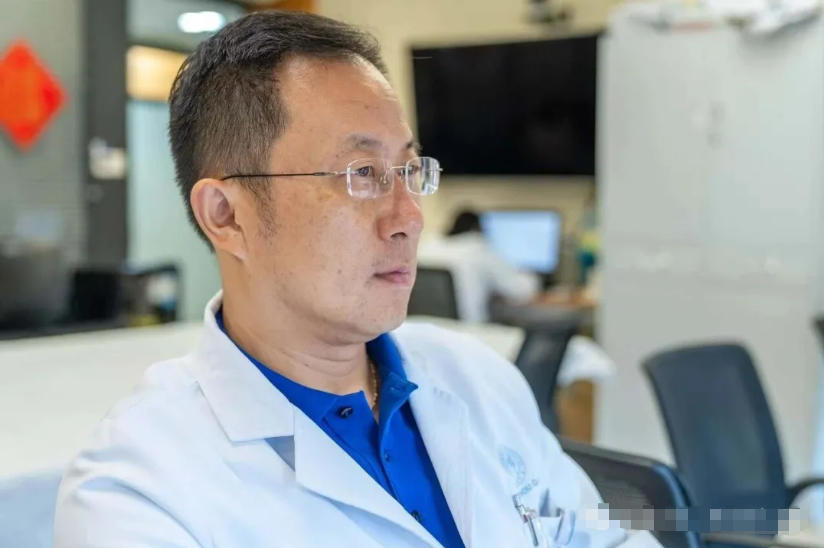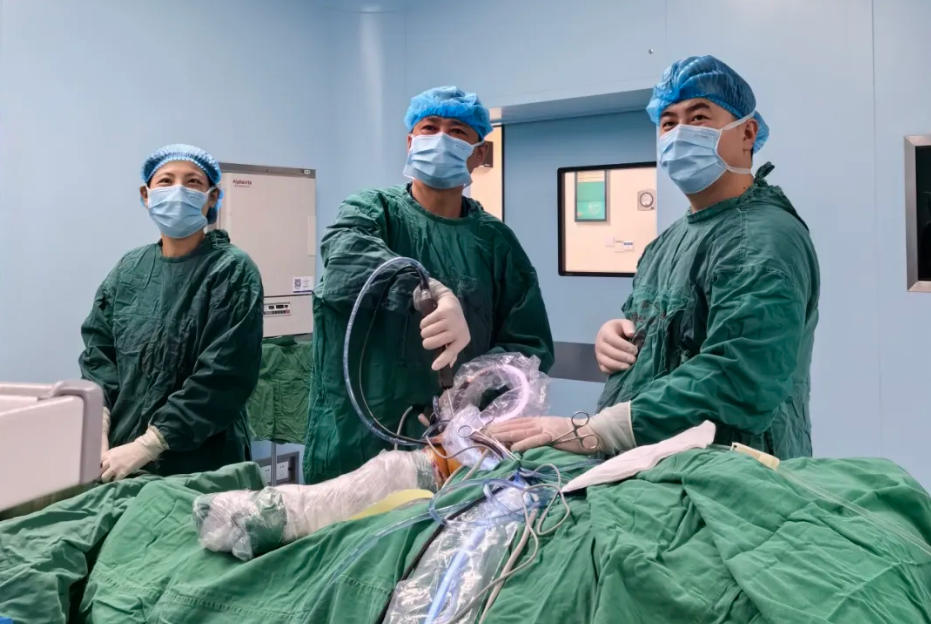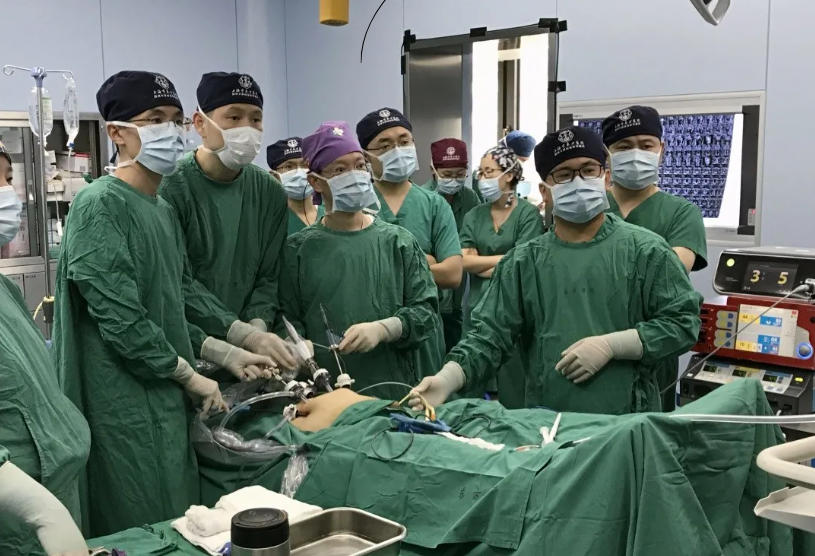Update time:2025-08-26Visits:6810

Xue Wei, Professor of Urology, Vice President of Renji Hospital
Introduction
He brings hope to countless patients with his exceptional surgical skills and profound medical insight. From his mother’s early influence that sparked his interest in medicine to his determined choice to pursue medical studies after high school; from five years of intensive training in university to countless challenges and growth at Renji Hospital. Every step reflects his deep dedication to medicine and respect for life.
He is a master surgeon with extraordinary expertise and a pioneer continuously advancing medical exploration, elevating Renji Hospital’s Urology Department to new heights. For him, every precise incision and meticulous suture represents his reverence and care for human life.
His influence is profound yet understated, like a steady force that nurtures growth. Through his journey, one senses an unwavering pursuit of medical excellence, deep compassion for patients, and an endless quest for knowledge. This represents a relentless dedication to the art of medicine and a deep understanding of life’s value.
The Path to Medicine
From a young age, Xue Wei’s mother cultivated his interest in medicine. This interest solidified into a firm commitment during his university applications, launching his lifelong journey in medicine. Along this path, he not only acquired extensive medical knowledge but also developed exceptional surgical skills and strong medical ethics through hands-on practice.
“I was born into a family of doctors in Shanghai; my mother was my first inspiration in medicine. She always encouraged me to pursue knowledge and explore the mysteries of life. After finishing high school, I listed only medical programs on my university applications – it was the path I yearned for most.”
Five years of university education provided Xue Wei with a solid foundation. Witnessing doctors save lives and treat patients firsthand instilled in him a deep understanding of a physician’s responsibility and mission. Gradually, he transformed his passion and compassion into the composed professionalism required of a doctor.
For Xue Wei, Renji Hospital is more than just a workplace; it’s where he grew professionally. From intern to attending physician, and eventually to department head, Xue Wei faced countless challenges and refined his skills there. Each experience improved his surgical techniques and strengthened his medical ethics.
His surgical development owes much to the careful guidance of mentors and senior physicians. They not only taught him medical knowledge and skills but also showed him how to face difficulties and maintain composure and focus under pressure. These experiences became invaluable assets in his medical career.
“Renji Hospital is my second home. When I entered Shanghai Second Medical University, I was placed in the Renji program. There, I was fortunate to meet Professor Huang Yiran. His surgical techniques and unique approach profoundly influenced me. I remember when I first joined the Urology Department, it was going through a difficult period. Yet, I believed in its potential and future, so I chose to stay.”
When Xue Wei joined the department, Renji Hospital’s Urology Department was in a transitional phase. The renowned veteran physicians had retired, while younger doctors lacked the experience to maintain stability – at the time, the department had only ten doctors, mostly junior physicians, plus retired professors who had returned to help. Even Xue Wei, then an intern, worried the department’s development might stagnate. The department head suggested that to overcome this challenge, more passionate young doctors needed to join. In that moment, Xue Wei was inspired.
In fact, Xue Wei witnessed the revitalization of Renji Hospital’s Urology Department.
Under Professor Huang Yiran’s guidance, Xue Wei grew rapidly, advancing from a novice intern to an attending physician capable of independently performing highly complex surgeries. He learned how to achieve surgical precision and how to remain calm and exercise sound judgment when facing complicated cases.
“Interns typically had no opportunity to enter the operating room back then. Due to the special circumstances and staff shortage, I became an assistant to attending physicians very early and stepped into the surgical arena.”
Xue Wei still considers himself incredibly fortunate. To this day, he feels deeply grateful that the department’s urgent needs broke with tradition, giving him earlier exposure to surgery, which then enabled his rapid and focused professional development.
At that time, the leading urology departments in Shanghai each had their own distinct strengths.
“Finding our niche and leveraging our strengths was our goal then. Without established standards, we forged our own path. While others focused on making the surgery itself aesthetically pleasing, we emphasized surgical anatomy – precisely which anatomical layer to enter to reach the target directly and efficiently. Furthermore, we refined our clinical diagnostic reasoning to avoid unnecessary detours.”
Xue Wei feels he was essentially thrust into the operating room. Assisting different lead surgeons, he observed the techniques of all his teachers, each with their own unique strengths.
“I still recall the senior director who had returned from retirement. He was a master of anatomy. His surgical approach was strictly by the book, tolerating no deviation; the slightest oversight meant starting over. I faced considerable challenges under him, but it was precisely this process that benefited me immensely, instilling his pursuit of perfection and laying a solid foundation for me.”
What left a lifelong impression on Xue Wei and earned his deepest admiration was Professor Huang Yiran’s exceptional surgical skills and unique approach, as well as Professor Wang Yixin’s calm and composed demeanor in critical situations.
Between 1993 and 1998, Renji’s Urology Department spent five years emerging from its difficult period, gradually establishing its own identity. Xue Wei admits that these five years didn’t just shape their approach; they established the right departmental philosophy, signifying a profound legacy and influence. It fostered a new understanding among doctors – that diseases could be overcome, not feared.
“Before 1993, a radical cystectomy could take from afternoon until dawn. Now, it takes about three hours. Surgery no longer relies solely on innate talent; through proper training, young doctors in the department can achieve rapid growth and development.”
Today, Xue Wei in the operating room embodies the strengths of many masters, demonstrating comprehensive and exceptional skill. He handles both open and minimally invasive surgeries, major and minor operations, with equal ease and proficiency.
In truth, Xue Wei might not be an inherently optimistic doctor. After most successful surgeries, doctors typically emerge congratulating each other. For him, however, there’s little to celebrate. Leaving the operating room, he’s always pondering, immersed in thought – where could it be better? What detail could be improved? “Understanding a problem or enhancing a skill is more important than completing a surgery.”
Today, Renji Hospital ranks among the top three nationally in prostate surgery volume, having long since moved from open surgery into the era of robotic surgery.

Being a Manager is Even Harder
In 2016, Xue Wei assumed leadership of Renji Hospital’s Urology Department from Dr. Huang Yiran. Under his guidance, the department reached unprecedented heights. He not only spearheaded the department’s strategic growth but also masterfully balanced innovation with established medical traditions.
As department chair, Xue Wei recognized that continuous exploration and innovation are essential to remain at medicine’s forefront. With an open mindset, he integrated advanced international medical concepts and technologies, driving breakthroughs in prostate cancer treatment. He prioritized cultivating a collaborative departmental culture and mentoring young physicians, dedicated to infusing new energy into the medical field.
“Leading Urology is both an honor and a profound responsibility. I constantly remind myself not to rest on current achievements but to pursue new breakthroughs. While our department has made significant strides in prostate cancer treatment, I know this is just the beginning. We must keep pace with global advancements, continuously developing more precise and minimally invasive therapeutic approaches.”
Under Xue Wei’s leadership, Renji’s Urology Department consistently set surgical records and achieved remarkable outcomes. He championed a multidisciplinary collaboration model, uniting specialists across fields to deliver comprehensive, personalized treatment plans. This approach not only improved success rates but also significantly enhanced patients’ quality of life.
Throughout the department’s evolution, Xue Wei has maintained a patient-centered philosophy. He believes medicine’s core purpose is improving lives, ensuring every patient receives dignified care. Thus, in both clinical practice and research, he relentlessly seeks optimal solutions—maximizing recovery while minimizing trauma.
“In departmental management, I advocate a flat organizational structure. This reduces hierarchy, empowering young physicians to showcase their talents. I encourage them to innovate, challenge conventions, and continuously expand their capabilities. I believe only through relentless learning and progress can one excel in medicine.”
Xue Wei understands that a department’s strength lies in its team. He has invested tremendous energy in mentoring young doctors, imparting not just medical expertise but also clinical reasoning and research acumen. Under his guidance, successive generations of physicians have rapidly developed into departmental leaders.
Under successive department chairs, Renji’s Urology Department has become a globally recognized center for urological care. Every team member takes pride in contributing to this legacy, constantly striving for excellence to deliver world-class patient care.
“I always emphasize that physicians need both exceptional skills and unwavering ethics. When mentoring young doctors, I stress prioritizing patients’ interests and treating each person with compassion. Only then can we earn patients’ trust and respect.”
Medicine transcends traditional service—it’s a scientific exploration of human life. Reducing healthcare to mere service misrepresents this noble profession. Its purpose is healing, demanding not just technical mastery but holistic patient understanding and care.
In Xue Wei’s talent development philosophy, nurturing young physicians is multifaceted. He believes doctors need solid expertise, but more critically, strong character and clinical judgment. This judgment isn’t rigid doctrine but wisdom refined through practice.
“Medicine differs from other service industries. We don’t just treat diseases—we provide comprehensive care and support. While we can’t guarantee every treatment’s success, we promise every patient our utmost effort, combining professional knowledge with compassion to help them heal.”
For Xue Wei, cultivating young doctors requires honing both surgical skills and ethical grounding. He emphasizes that character determines whether physicians earn patient trust. While skills develop through training, integrity forms the foundation of medical professionalism.
Moreover, clinical judgment is a physician’s most valuable asset. It demands crafting personalized treatment plans based on each patient’s unique needs—requiring deep medical knowledge, keen observation, and sound decision-making.
“I often tell young doctors that medicine is a challenging career. It demands rigorous study, continuous training, and growth through practice. Every patient is unique; we must listen attentively to understand their needs and apply our expertise to help them.”
Under Xue Wei’s mentorship, young physicians learn to integrate clinical work, teaching, and research. He views these as interconnected pillars that reinforce each other. Only by merging clinical practice with research can doctors continuously elevate their expertise.
Xue Wei encourages young doctors to explore innovative approaches for rare and complex cases. He considers these cases invaluable learning opportunities that accelerate clinical reasoning and problem-solving skills.
“Clinical practice, teaching, and research form the triad of medical excellence. Only by integrating these can we become exceptional physicians. I also urge young doctors to embrace challenging cases—they’re your greatest growth opportunities.”
Xue Wei’s talent development philosophy provides clear direction for emerging physicians and revitalizes the medical field. His principles will guide future generations of Renji doctors toward continued innovation.
Xue Wei deeply understands…

Research Drives Urological Advancement
Today, advancing medical disciplines requires more than clinical excellence—it demands driving practice through research. Xue Wei recognizes that integrating basic medical research with clinical care is essential for medical progress.
“Research, for me, is an endless journey of discovery. In prostate cancer diagnostics, our team relentlessly pursues technologies beyond PSA testing. We believe only through more precise diagnosis can we deliver truly personalized, effective treatments.”
Under Xue Wei’s leadership, Renji’s Urology research team has achieved groundbreaking advances. By investigating prostate cancer’s molecular mechanisms, they’ve developed novel biomarkers that enhance early detection accuracy. These breakthroughs offer new hope to patients while advancing global medical knowledge.
“We collaborate deeply with basic research, leveraging technologies like framework DNA to transcend traditional PSA-based detection, seeking more precise diagnostic methods.”
Multidisciplinary integration—a cornerstone of modern medicine—is another area where Xue Wei leads. He champions cross-disciplinary partnerships, merging engineering, informatics, and medicine to drive technological innovation. In mentoring young doctors, he cultivates research skills, encouraging bold exploration of uncharted territories to shape medicine’s future.
“Medical-engineering integration has opened new frontiers. By collaborating with diverse experts, we gain multifaceted perspectives to develop innovative solutions. I believe this cross-disciplinary model represents medicine’s future.”
Xue Wei prioritizes developing research skills in young physicians. He encourages their participation in research projects, refining their abilities through hands-on experience. Under his mentorship, young doctors have excelled clinically while demonstrating exceptional research talent.
Xue Wei collaborates with engineers, data scientists, and other specialists, applying artificial intelligence and big data analytics to prostate cancer diagnosis and treatment. These technologies have significantly enhanced care quality and efficiency.
Looking ahead, Xue Wei anticipates transformative technological impacts on medicine. He envisions increasingly intelligent, personalized care driven by advancements in robotic surgery, gene editing, and regenerative medicine—offering patients new treatment options and hope.
“I’m excited about the future. As technology evolves, we’ll deliver more precise, personalized treatments. I also look forward to seeing young doctors thrive in this era of opportunity, contributing to medical progress.”
Xue Wei’s research journey embodies challenge and innovation. His achievements have advanced medical technology while directly improving patient lives.
Under his leadership, Renji’s Urology research team explores medicine’s frontiers with openness and ingenuity. Their efforts have brought distinction to the department while advancing global healthcare.
“Both clinical practice and research are marathons without finish lines. With curiosity, courage, and continuous learning, we’ll unravel medical mysteries and advance human health. This is my mission as physician and researcher.”
Historically, Renji Hospital pioneered prostate cancer treatment in China, with research dating to the 1980s. Professor Jiang Yu, a field pioneer, authored the first foundational article. Xue Wei built on this legacy, performing open prostatectomies with his mentor Dr. Huang Yiran starting in 1995. His exceptional skill and dedication quickly established him as a leader.
As medical technology advanced, Xue Wei guided his team through minimally invasive surgery and into the robotic surgery era. As clinician-scientist, educator, and administrator, he relentlessly pursues excellence, poised to make even greater contributions to medicine.
Editor:
Chen Qing @ ShanghaiDoctor.cn
If you'd like to contact to Dr. Xue, please be free to contact the email of Chenqing@ShanghaiDoctor.cn.
Note: Chinese Sources from “The Path of Benevolent Medicine” which was published in 2024. It records 90 important medical figures in the history of Renji Hospital. Yewen Renyi (ShanghaiDoctor.cn) team was one of the major writers of the book and is authorized by Renji hospital to create English version on the website of ShanghaiDoctor.cn
Hospital: Renji Hospital, Shanghai Jiao Tong University School of Medicine
Dr. Zhou Qianjun | “Sculpting Life in the Chest” – A Portrait” – A Portrait
Dr. Cai Junfeng | Guarding Bone and Joint Health, Improving Quality of Life
Dr. Xu Xiaosheng|The Gentle Resilience of a Male Gynecologist
Dr. Shi Hongyu | A Cardiologist with Precision and Compassion
Dr. Zhang Guiyun|The Inspiring Path of a Lifesaving Physician
Dr. Chen Bin | Building the Future of ENT Surgery at Lingang,Shanghai
Prof. Zhang Baigen | The Oral History of China’s Vascular Surgery

Dr. Zhou Qianjun | “Sculpting Life in the Chest” – A Portrait” – A Portrait

Dr. Cai Junfeng | Guarding Bone and Joint Health, Improving Quality of Life

Dr. Cui Xingang | The Medical Dream of a Shanghai Urologist

Dr. Xu Xiaosheng|The Gentle Resilience of a Male Gynecologist

Dr. Shi Hongyu | A Cardiologist with Precision and Compassion

Dr. Zhang Guiyun|The Inspiring Path of a Lifesaving Physician

Dr. Jiang Hong | Bringing Hope to Vascular Frontiers

Dr. Huang Jia | A Journey of Healing "Breath"

Dr. Chen Bin | Building the Future of ENT Surgery at Lingang,Shanghai

Prof. Zhang Baigen | The Oral History of China’s Vascular Surgery